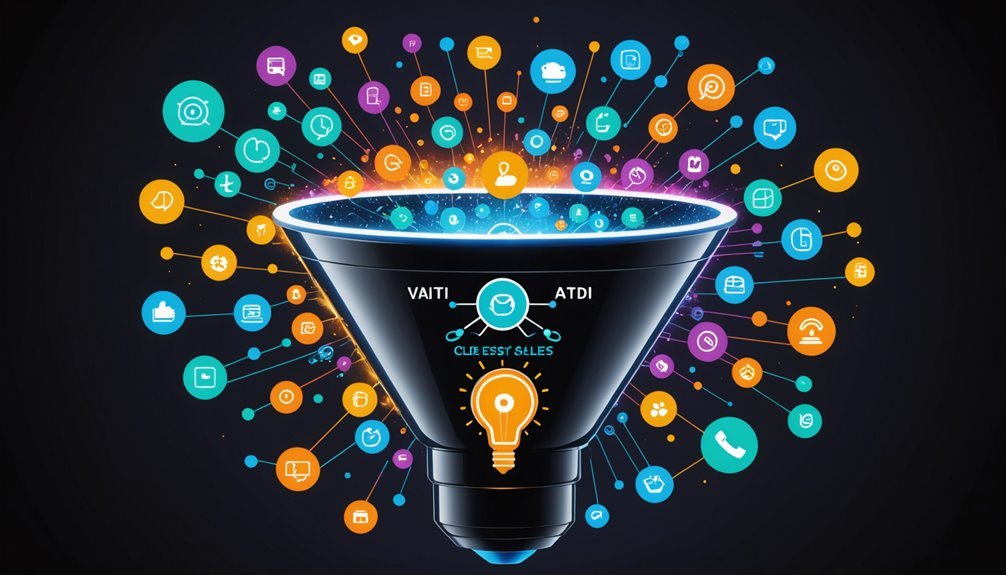AI chatbots and voice assistants are catalyzing a revolution in sales automation, powering a groundbreaking ‘Speed to Lead’ paradigm. By automating repetitive tasks, they increase operational efficiency and provide 24/7 customer support, revolutionizing the lead generation and qualification processes. Their deployment not only improves customer engagement and satisfaction but also reshapes sales infrastructure by mitigating manual tasks and facilitating data-driven decision-making. Understanding this rapidly evolving AI-driven transformation will reveal further insights into future trends, strategic investments, and cost-efficiency benefits associated with sales automation. As you explore deeper, you will recognize the dynamic potential of AI tools to reshape traditional sales roles and processes.
Enhancing Sales with AI Chatbots and Voice Assistants LaunchedKey Takeaways
- AI chatbots and voice assistants optimize sales automation by streamlining repetitive tasks, automating data entry, and improving lead qualification.
- These AI tools enhance customer experiences and engagement through personalized interactions, faster response times, and real-time insights.
- Automation of sales tasks leads to significant efficiency gains and cost reductions, allowing businesses to scale their sales efforts effectively.
- The global sales automation market, significantly powered by AI, is anticipated to double by 2025. The majority of customer-retailer interactions are expected to be AI-driven.
- AI is redefining traditional sales roles and processes, increasing productivity, enhancing relationship management, and necessitating continuous adaptation from sales teams.
Understanding AI Chatbot Impact on Speed to Lead
The integration of AI Chatbots has swiftly taken center stage in the business world, shedding light on a multitude of opportunities to improve sales and customer interactions. Over 80% of businesses are considering integrating chatbots within the next five years, mainly due to their effectiveness in sales and customer support. Leaders have seen a 67% increase in sales through AI Chatbots, with 26% of all transactions originating from these interactions.
Chatbots also foster stronger consumer-brand relationships and facilitate opportunities for upselling. A staggering 56% of companies view these digital assistants as potential game-changers and 43% note that rivals are already implementing them. The emphasis on customer experience is paramount, and 86% of clients are willing to pay a premium for superior service. These AI-powered tools resolve 58% of returns and cancellations, and 90% of businesses report quicker complaint resolution.
In terms of lead generation, companies using digital assistants report an increase in high-quality leads and heightened traffic segmentation. Chatbots contribute significantly to ROI, convert visitors into leads, and even manage to convert inquiries into sales without personal involvement. Beyond that, with the help of automation tools like chatbots, businesses have been able to effectively segment their audience, enabling them to customize communications based on past interactions, further enhancing the customer engagement process. The impact of AI Chatbots is undeniable, and their role in propelling business success is increasingly remarkable. In fact, it is projected that businesses could save 2.5 billion work hours by 2024 due to the use of AI Chatbots, showcasing their potential for drastically improving business productivity.
Voice Assistants in Sales
Embracing the functionality of voice assistants in sales automation has the potential to considerably streamline operations, with a specific emphasis on the automation of repetitive tasks. The efficiency of AI voice bots allows sales teams to operate at peak performance, freeing up valuable time for more strategic initiatives. Furthermore, the immediate insights provided by these groundbreaking tools can drive more informed decision-making and foster a more dynamic, responsive sales process. Notably, the incorporation of AI and automation has been found to enhance lead conversion rates and provide valuable customer insights, improving the overall performance and efficiency of sales operations.
Automating Repetitive Sales Tasks
In the evolving landscape of sales, automation is steadily gaining prominence, and voice assistants are playing a pivotal role in this transformation. Through automating repetitive sales tasks, these AI-powered tools streamline processes and bolster sales efficiency. For instance, in lead qualification, voice assistants immediately engage potential customers, analyze their readiness to purchase, and prioritize high-quality leads, thereby improving conversion rates.
Furthermore, AI chatbots are revolutionizing the scheduling and appointment-setting process. By integrating with calendar systems, they allow leads to book appointments effortlessly, send automated reminders, and manage time zones effectively. This automation reduces manual labor, enabling sales teams to focus more on closing deals and nurturing connections. By doing so, it significantly boosts productivity by automating tasks that can consume a considerable amount of time.
The automation extends to follow-up tasks as well. AI sales assistants maintain regular, tailored communication with leads and handle post-meeting engagements. This consistent contact mitigates lead drop-offs and contributes to higher conversion rates.
Moreover, voice assistants improve the customer experience by offering round-the-clock support, tailored product recommendations, and efficient product navigation. By automating these tasks, sales teams can concentrate on high-value activities, making the business more customer-centric and efficient. These voice AI technologies, like Dasha, can manage multiple interactions simultaneously, ensuring swift and accurate responses to customer inquiries, thus further enhancing the efficacy of sales processes (various interactions).
AI Voice Bots Efficiency

Leveraging AI’s prowess, voice bots have emerged as a game-changer in the sales landscape, greatly enhancing efficiency and productivity. By integrating AI solutions across platforms, businesses can improve sales efficiency, guaranteeing seamless customer interactions. These ultra-authentic AI agents reduce wait times and provide immediate support, considerably enhancing customer service.
AI voice bots excel in lead qualification, gathering information, evaluating intent, and determining the best course of action. This individualized approach to sales interactions builds stronger connections with prospects, ultimately driving higher conversion rates. The capability of AI-powered virtual assistants to operate 24/7 guarantees customers can always receive support, thereby amplifying customer engagement.
Streamlining sales processes, these AI-powered voice assistants automate tasks and reduce administrative work, freeing up valuable time for sales representatives to focus on high-value activities. They capture and analyze customer interactions in real time, providing valuableinsights that inform sales strategies. Additionally, by automating follow-up processes, they guarantee timely and tailored communication with customers, contributing to faster sales cycles and increased productivity. As businesses continue to harness the potential of AI voice bots, the future of sales automation appears promising. Also, by dispelling common misconceptions about sales automation, these AI tools are proving that they enhance rather than replace human sales efforts, thereby driving growth.
Furthermore, the integration of AI in marketing has shown significant potential in enhancing the overall user experience, thereby leading to improved sales performance (AI in marketing).
Real-time Sales Insights
Utilizing the power of AI, voice assistants are revolutionizing the sales landscape by providing authentic-time insights. These tools integrate seamlessly with CRM systems and other sales tools to provide instantaneous data analysis. They can swiftly pull up a lead’s interaction history, recommend next steps, and identify potential upselling opportunities. The power of AI lies in its capacity to analyze and learn from past conversations, identify successful sales techniques, and recommend them in actual time. This increases the efficiency and effectiveness of sales strategies.
Furthermore, AI-powered voice assistants are enhancing customer interactions by detecting emotions and buying cues during conversations. By automating repetitive tasks, they keep the sales momentum going, allowing sales representatives to focus on more nuanced aspects of the sales process.
Moreover, these voice assistants can streamline sales processes by automating tasks like data entry, call logging, and lead qualification. They can also provide real-time support during sales calls by pulling up relevant data or answering complex questions. The use of AI-powered voice assistants reduces the average lead response time from hours to moments, markedly improving customer satisfaction and positively impacting sales.
Adding to the benefits, voice assistants can significantly contribute to effective lead follow-up strategies, ensuring timely and personalized communication that enhances conversion rates and customer satisfaction.
Lead Generation Revolution

The strategic deployment of AI chatbots and voice assistants is propelling the revolution in lead generation. These tools automate and optimize the lead generation process, qualify leads with precision, and offer individualized recommendations that increase conversion rates. By leveraging natural language processing, AI chatbots understand customer preferences and provide customized assistance, improving engagement and reducing bounce rates. Furthermore, with the ability to distinguish between hot, warm, and cold leads, these AI tools are making the job of sales teams easier by focusing their efforts on high-potential prospects. In addition, AI chatbots are significantly decreasing customer service costs by handling up to 80% of routine inquiries, thus freeing up human resources for more complex tasks and resource allocation optimization.
| Lead Generation Efficiency | Individualized Engagement | Sales Process Automation |
|---|---|---|
| AI chatbots guarantee no potential lead is left unattended. | AI chatbots analyze user behavior to provide tailored recommendations. | AI chatbots automate aspects of the sales funnel, such as scheduling demos. |
| They provide 24/7 availability, improving customer engagement. | Individualized interactions lead to higher conversion rates and stronger loyalty. | They can handle 80% of routine inquiries 80% faster than automated agents. |
| They streamline the process by automating tasks like information capture. | They can reach out with custom offers based on user behavior. | AI chatbots direct prospects to the right resources, boosting lead conversion rates. |
In the near future, we can expect improved customization, enhanced emotional intelligence, and seamless handoffs between chatbots and automated agents, further revolutionizing lead generation.
Qualifying Leads With AI
The advent of AI in lead generation has initiated a transformation in sales automation, paving the way for intelligent and efficient lead qualification. By utilizing AI capabilities, businesses can improve their lead scoring models, enriching their pipelines with high-quality prospects and increasing sales conversion rates. An excellent example is the use of AI chatbots and voice assistants for real-time engagement, which significantly enhances the lead qualification process by using natural language processing to analyze and respond to customer inquiries. The ensuing discourse will elucidate the role of AI chatbots and voice assistants in streamlining this process, focusing on their potential to change sales strategies and drive revenue growth. In doing so, these AI tools help reduce manual tasks and free up valuable time for sales reps to focus on relationship building and deal closing (reducing time spent on manual lead qualification). On top of this, the utilization of AI tools can lead to more accurate data analysis, which in turn can be used for optimizing sales strategies and enhancing the overall lead generation process.
AI in Lead Generation
In an increasingly digitized market landscape, Artificial Intelligence (AI) has dramatically transformed the traditional lead generation process. By automating and optimizing the process, AI has streamlined lead generation, ensuring efficiency and scalability. Authentic-time, individualized interactions powered by AI improve engagement and elevate conversion rates.
AI’s 24/7 availability via chatbots constantly captures leads, ensuring no opportunity is missed. Additionally, AI’s ability to analyze diverse data sources to identify patterns and predict lead quality leads to significant cost savings by reducing manual tasks and improving accuracy.
Another key benefit is operational efficiency. AI chatbots precisely qualify leads, filtering out less promising ones. Predictive analytics compare leads to business profiles, forecasting conversion likelihood. This, coupled with individualized recommendations and authentic-time interactions, enhances lead routing efficiency.
Technical implementation involves CRM integration for tracking lead data, the use of AI-powered platforms like Drift and Intercom, and machine learning models for lead scoring. Natural language processing engages visitors in meaningful conversations, and automated sequences nurture leads.
Ultimately, AI improves performance by enhancing conversion rates, customer satisfaction, and scalability. It also offers data-driven insights for strengthening strategy. Thus, AI in lead generation provides a path to freedom from traditional constraints.
Smart Lead Qualification
Utilizing the power of artificial intelligence, brilliant lead qualification has transformed the sales process by providing a more efficient and accurate method of identifying high-quality leads. By integrating data from diverse sources such as CRM systems, websites, and social media, AI creates extensive lead profiles. It uses machine learning algorithms like predictive analytics and natural language processing to sift through the data. AI assigns scores to leads based on demographic fit, behavioral engagement, and company data, prioritizing them for sales outreach.
Automation has replaced manual processes, freeing up time for sales teams to focus on critical tasks. AI-powered chatbots and Voice AI engage leads, determining their intent, budget, and readiness to buy. The system’s ability to process data in actual time allows for instant identification and prioritization of qualified leads.
Implementing AI-powered lead qualification requires clear criteria aligned with the ideal customer profile, selecting the right solution, continuous training of AI models, and regular ROI measurement. The future of lead qualification is AI-driven, promising increased efficiency, accuracy, immediate insights, and tailored nurturing of leads.
Boosting Sales Conversion
Building on AI’s groundbreaking impact in brilliant lead qualification, it’s crucial to investigate its role in enhancing sales conversion. AI streamlines the lead qualification process and increases its efficiency and accuracy, thereby improving sales conversion rates.
AI-powered techniques, such as data integration, machine learning, and lead scoring, create thorough lead profiles and identify patterns indicating lead readiness to buy. It allows for customized nurturing, increasing engagement rates, and improving conversion probabilities. Additionally, the power of AI lies in its scalability and immediate processing, ensuring consistency and promptness.
- Efficient and Accurate: AI reduces manual tasks and accurately predicts which leads are most likely to convert.
- Customized and Instant: AI tailors communication strategies to unique leads and provides instant responses, enhancing engagement and conversion rates.
- AI is scalable and Immediate. It can handle any lead volume and process data in real time, ensuring consistency and prompt follow-up.
Maximizing Sales Funnel Efficiency

A significant proportion of businesses are turning to AI chatbots and voice assistants to improve sales funnel efficiency. This is achieved through automated lead qualification, where these AI tools gather information, assess intent, and determine the most suitable action for each lead. By using pre-qualification questions, AI voice bots can identify leads that are ready to move further down the sales funnel. In contrast,e efficient lead routing guarantees these qualified leads are directed to the appropriate sales team.
AI’s contribution doesn’t stop at lead qualification. It also automates repetitive tasks such as data entry, freeing up sales representatives to focus on high-value activities. Aided by AI, businesses can now provide customized interactions that drive higher conversion rates and revenue growth. Additionally, AI voice bots take over appointment scheduling, promoting efficiency and accuracy.
The benefits of AI extend to streamlining sales processes. AI makes possible swift lead response times, AI-driven communication, automated follow-ups, and efficient lead engagement. Essentially, AI chatbots and voice assistants are not just improving the sales process but revolutionizing it.
AI and Customer Experience
In the domain of sales automation, artificial intelligence (AI) is pivotal in transforming customer experience. Specifically, its capacity to customize user interactions enhances engagement metrics, thereby redefining customer service norms. This shift, marked by efficiency and uniqueness, benefits customers and presents a strategic advantage for businesses in the online environment.
Personalizing User Interactions
Customization, powered by advanced AI models, is revolutionizing customer interactions in the business landscape. AI enables businesses to analyze customer behavior and preferences, offering bespoke experiences that improve satisfaction, loyalty, and long-term engagement. This individualized approach not only streamlines customer experiences by providing relevant options at the right time but also understands context, intentions, and sentimental cues, significantly improving customer service.
- AI voice assistants can provide 24/7 support, minimize wait times, and customize interactions based on past customer data. This transforms customer experiences through individualized service and efficient issue resolution.
- Measuring ROI is essential for optimizing AI customization investments. Key metrics include customer lifetime value, conversion rates, retention rates, customer satisfaction scores, and net promoter scores.
- In sales automation, AI voice bots and chatbots identify and engage leads, offer assistance, and recommend products.
In an era where customers desire freedom and control over their interactions, AI customization offers the perfect blend of efficiency, relevance, and human touch. Embracing this revolution will enable businesses to stay ahead in the competitive landscape.
Enhancing Engagement Metrics
With an impressive 70% faster response time than staff agents, AI chatbots have become an indispensable tool for businesses aiming to improve engagement metrics. These intelligent systems work round the clock, providing immediate responses and significantly increasing customer satisfaction. Remarkably, more than 60% of consumers prefer messaging an online chatbot to waiting for an automated agent, underlining the potential of this technology.
As AI continues to evolve, chatbots are becoming more capable of recognizing and responding to customer sentiments, further improving the engagement experience. Multi-channel integration also guarantees a seamless and consistent customer experience.
| Key Benefits of AI Chatbots | Improving Customer Experience | Impact on Sales Performance |
|---|---|---|
| 70% Faster Response Times | Reduced Wait Times | 67% Increase in Sales |
| 24/7 Availability | Tailored Interactions | 36% Businesses Use Chatbots |
| Instant Responses | Multi-Channel Integration | Automated Lead Qualification |
| Higher Engagement Rates | Improved Sentiment Awareness | Enhanced Sales Data Analysis |
The future of AI chatbots looks promising. Trends indicate an increased focus on proactive engagement, voice-based interactions, and advanced analytics. Integrating AI chatbots with advanced technologies like AR and VR offers exciting prospects for improving customer engagement and enhancing sales performance.
Engagement Through AI Tools

Today’s businesses are revolutionizing the way they engage with their prospects and customers by utilizing artificial intelligence. AI-powered tools, such as chatbots and voice assistants, are at the forefront of this transformation, providing individualized, efficient, and scalable engagement strategies.
AI tools offer numerous benefits, including:
- Automated Lead Qualification: AI chatbots streamline the lead qualification process by asking initial questions about intent, budget, and readiness to buy.
- Tailored Engagement: Tools like AiSDR utilize data from platforms like LinkedIn and HubSpot to deliver hyper-personalized messages to prospects.
- Dynamic Segmentation: AI chatbots categorize leads into segments, such as high-priority or nurture, based on their responses.
As the technology continues to evolve, the integration of AI with sales processes will become more seamless, and businesses will be able to scale their engagement strategies more effectively. Additionally, AI tools will provide invaluable data insights that can help refine engagement strategies and improve sales outcomes. The future of sales automation lies in the power and potential of AI.
Conversion Metrics With AI
In sales automation, AI has become an indispensable tool for driving conversion metrics. AI-driven lead scoring and prioritization implement algorithms that categorize, and score leads based on projected value and readiness to engage. This not only streamlines lead engagement but also guarantees consistent and accurate scoring to reduce manual error.
Furthermore, AI tools improve performance in sales by enhancing response times, creating individualized interactions, and reducing friction in the buying process. These factors contribute to significant improvements in conversion rates. Guided selling through AI, for instance, tailors recommendations and comparisons to facilitate easier decision-making for prospects.
The efficiency brought about by AI automation also results in remarkable cost savings. By automating routine tasks, AI enables the sales staff to handle more leads effectively. This not only increases productivity but also guarantees accuracy and consistency in communications.
Lastly, AI and chatbots improve the customer experience through immediate, tailored interactions. This, combined with AI-driven insights for personalized communication strategies, helps to turn one-time buyers into loyal customers. These are just some of the ways AI is revolutionizing conversion metrics in sales automation.
AI Chatbots and ROI

Chatbots powered by artificial intelligence have emerged as an integral part of maximizing return on investment (ROI) in sales automation. They are revolutionizing the sales landscape, providing companies with cost-effective solutions to improve customer interactions and streamline operations.
Utilizing AI chatbots brings several benefits to an organization:
- They automate routine tasks, reducing operational costs and allowing sales teams to focus on high-value activities.
- AI chatbots engage customers in actual time, providing tailored experiences that increase satisfaction and raise conversions.
- They collect valuable data about customer behavior, offering insights that can be used to customize marketing strategies and enhance lead qualification.
In essence, AI chatbots are a strategic investment that drives ROI growth. They improve customer engagement, refine sales processes, and provide timely offers based on customer behavior. Additionally, they help reduce cart abandonment by sending automated reminders and incentives to customers. Finally, chatbots provide valuable analytics, enabling businesses to track performance and make data-driven decisions to refine their strategies. Embracing AI chatbots is, therefore, a path to freedom, allowing companies to optimize their operations while delivering superior customer experiences.
Future of Sales Automation
As we steer towards the future, the landscape of sales automation is taking a groundbreaking leap, driven by advancements in artificial intelligence and evolving market trends. The global sales automation market is projected to double by 2025. Coupled with the surge in digital channel engagement, this progression underlines an urgent need for businesses to adapt swiftly.
AI is poised to reimagine the sales professional’s role, with 74% of them anticipating this revolutionary shift. The ubiquity of AI-assisted interactions, where 95% of customer-retailer touchpoints would be AI-driven by 2025, further underscores the AI revolution in the sales sector.
Hyperautomation, predictive analytics, and seamless tool integration are shaping the future of sales processes. The ability to deliver genuine-time insights, forecast lead potential, and craft hyper-personalized outreach heralds a new era of efficiency and productivity.
The benefits are numerous, from higher customer satisfaction to increased sales and efficient lead qualification. Ultimately, sales automation’s future lies in leveraging AI to streamline operations and improve the shopping experience. This will enable businesses to focus on relationship-building and deal-closing, the core of sales.
Frequently Asked Questions
What Is the Cost of Implementing AI Chatbots and Voice Assistants in Sales?
Implementing AI chatbots can cost between $10,000 and $150,000+, depending on their complexity. Setting up a voice assistant can cost from a few thousand to tens of thousands of dollars. Supplementary costs include training, optimization, and recurring maintenance.
How Does AI Technology Ensure the Security and Privacy of Customer Data?
AI technology guarantees client data security and privacy through robust methods such as regular security assessments, state-of-the-art protocols, data anonymization, user education, and vigilant monitoring against potential vulnerabilities and breaches.
What Are some success stories of companies utilizing Cchatbotsfor sales automation?
Many companies have successfully utilized AI chatbots for sales automation. These include Subway, Aveda, Cdiscount, and GAP, all of which reported increased sales and improved customer engagement following chatbot personalization.
Does the Use of AI Tools Require a Certain Level of Technical Expertise?
Yes, utilizing AI tools necessitates a certain level of technical expertise. Skills in programming, data analysis, machine learning, AI and ML frameworks, cloud computing, and AI security are integral for efficient deployment and maintenance.
Can AI Chatbots and Voice Assistants Effectively Replace Human Sales Representatives?
AI chatbots and voice assistants can automate routine sales tasks but cannot fully replace personnel sales representatives. They lack the affective intelligence and nuanced understanding needed for complex negotiations and building meaningful client relationships.
Conclusion
To summarize, AI chatbots and voice assistants are transforming the landscape of sales automation. Like expert chess players, they anticipate moves, strategize and execute with precision, revolutionizing lead generation, qualification, engagement, and conversion. Their impact on ROI is significant, signaling a new era in sales automation. As they evolve, they will continue to reshape strategies, driving efficiency and effectiveness and ultimately reshaping the future of sales.

Erik Remmel is a co-founder of Launched, a platform that helps businesses grow through AI-powered marketing, automation, and lead generation. He focuses on building scalable systems that convert cold leads into customers while streamlining operations with smart, AI-driven workflows.

